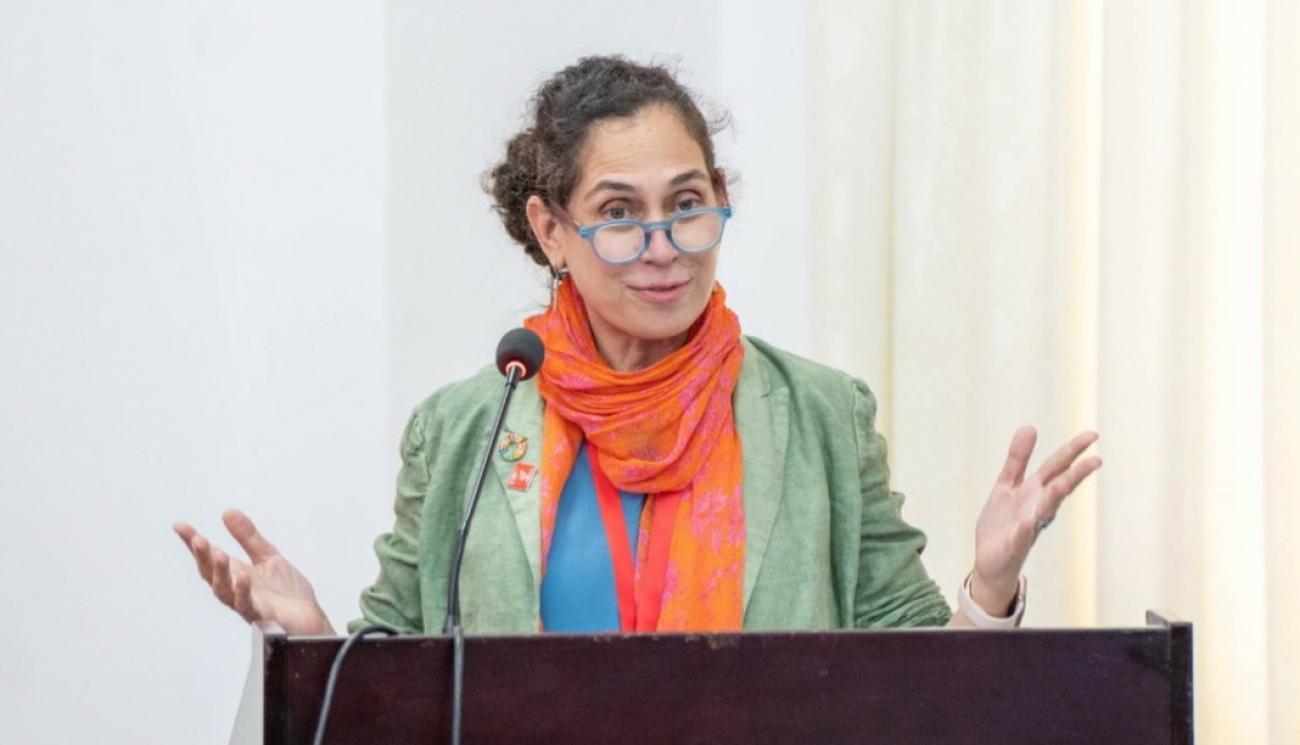The Government of Guyana has been commended for its commitment to integrating human rights into national planning by senior United Nations (UN) representative.
Yeşim Oruç, United Nations (UN) Resident Coordinator, praised the Government of Guyana for accepting a majority of the 190 recommendations for Guyana from the Universal Periodic Review, which is an indication of its intention to engage international human rights mechanisms in domestic efforts.
She was at the time delivering remarks during a panel discussion on Human Rights and Sustainable at the inaugural Human Rights Day exhibition, hosted by the Ministry of Parliamentary Affairs and Governance.
Ms. Oruç, in her delivery stated that the 2030 Agenda is unequivocally anchored in human rights and is explicitly grounded in the Universal Declaration on Human Rights (UDHR). She noted that although the specific Sustainable Development Goals (SDGs) are not framed in terms of human rights, many targets reflect the content of international standards. "For instance, SDG 1 (no poverty), SDG 2 (zero hunger), SDG 3 (good health and well-being), SDG 4 (quality education), SDG 6 (clean water and sanitation), SDG 8 (decent work and economic growth), and SDG 11 (sustainable cities and communities) reflect much of the core content of economic, social and cultural rights. SDG 16 on peace, justice, and strong institutions addresses some key dimensions of civil and political rights, including personal security, access to justice and fundamental freedoms. SDG 17 addresses issues related to the right to development and means of implementation," she said.
In highlighting the role of the UN System in Guyana she emphasised that the Government of Guyana is the duty bearer with the responsibility and the political intent, the policy framework and the budgetary and human resources capability to effect both the SDG transformation and the respect, protection and promotion of rights. She identified three (3) priority areas which the UN is eager to pursue with Government.
- Support member states to ensure that human rights principles inform implementation of the 2030 Agenda, including empowering people and creating avenues for civil society participation, as well as taking human rights-sensitive, non-discriminatory approaches to data collection, monitoring, and reporting. This is the surest way to bring the benefits of the ambitious and far-reaching agenda to all, leaving no one behind. In this context, consultations for and the anchoring of Guyana’s Low Carbon Development Strategy (LCDS) in the global goals including the Paris Agreement and the Escazu Agreement provide an inspiring example. As the UN system, we continue to engage with our national partners to seek entry points to expand the positive benefits from this national Strategy towards greater alignment with global goals and for leaving no one behind.
- Support member states and other stakeholders in making better use of the Universal Periodic Review outcomes, as well as of reports of the treaty bodies in national development planning. We were proud to support Minister Teixeira a few weeks ago to convene a training workshop on the Human Rights-Based approaches to inform national budgetary processes. We were also proud to support dedicated workshops on integrating the Conventions on the Rights of Persons with Disability and of Migrant Workers in national planning. These events saw the participation of ministries, departments and constitutional commissions. Several UN colleagues and I sat through the sessions, with a keen ear to listen to the Ministry of Finance’s human rights-based approach to budgeting. I look forward therefore now to hear more from Minister Singh on how Guyana’s increasingly robust, and I must say exciting budgets, now using oil and gas revenues, enable both SDG achievement while responding specifically to UN Human Rights Treaty body recommendations. Furthermore, UN agencies, UNICEF, UNWOMEN and UNDP, to note a few, are currently or have plans to support the relevant national constitutional commissions on the rights of the child, women and ethnic relations and others.
- Continue our efforts to help design policies that support the most vulnerable and/or excluded groups, recognizing and responding to multiple and intersecting deprivations and sources of discrimination that limit opportunities and make it harder to escape poverty, live with dignity and enjoy human rights on a healthy planet. Our UN Cooperation Framework and its associated implementation plans are our agreements with the Government on how we get there. Let me give a couple examples and recall what I said at the outset; the SDGs are achieved by the state party not the UN. As I look at some of the early results of UN agencies’ work with line ministries, I am pleased to see how national ministries are meeting and exceeding some of their targets from health to education.
She reiterated that the UN remains committed to working government and civil society partners to gather and share knowledge and data to support policy decisions and foster collective actions for achieving the SDGs. "The UN will continue to utilize every opportunity to deliver on its mandate, roles and functions to support member states, to promote and protect human rights and sustainable development," she said.
Read full speech here: https://bit.ly/3FnKRSJ


















